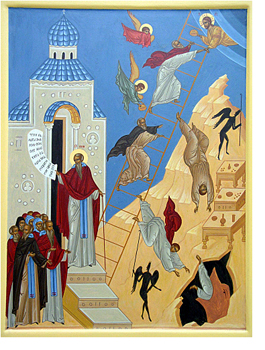|
|||
|---|---|---|---|
| This weekly bulletin insert complements the curriculum published by the Department of Christian Education of the Orthodox Church in America. This and many other Christian Education resources are available at http://dce.oca.org. | |||

"Can the writing of a hermit and monk who lived 1500 years ago say something to us today?" Pope Benedict XVI asked this question at a general audience in Vatican City. The monk he referred to was Saint John Climacus, whom we celebrate on the fourth Sunday of Great Lent. The Pope answered his own question by saying that Saint John's great work, "The Ladder of Divine Ascent", most certainly has something to say because it teaches us to be humble and charitable, both necessary attributes for Christians. Saint John lived in a monastery on Mount Sinai in the sixth century and was known for his piety and wisdom. Having long been urged to write his thoughts on spiritual growth, he finally did so in this book. "Climacus" means "of the ladder" and Saint John chose to divide the book into thirty chapters, each of which is a step on the ladder, guiding us in practicing a particular Christian virtue. One virtue leads to another, again like the steps or rungs of a ladder, taking us closer to communion with God. The book was written for John's fellow monks, but as part of the first step of the ladder he addresses those who live in the world and might protest that the life he describes is impossible for them because "we have wives and are beset with social cares, and how can we lead the solitary life?" He replies: "Do all the good you can; do not speak evil of anyone; do not steal from anyone; do not lie to anyone; do not be arrogant towards anyone; do not hate anyone; do not be absent from the divine services; be compassionate to the needy; do not offend anyone; do not wreck another man's domestic happiness, and be content with what your wife can give you. If you behave in this way, your will not be far from the Kingdome of Heaven." Centuries before Saint John Climacus wrote, another John—the great Chrysostom—also asserted, but with his typical forcefulness, that every Christian, monastic or lay, must strive to live a godly life. He particularly applied his words to those raising children: "Don't say, 'Bible reading is for monks; am I turning my child into a monk?' No! It isn't necessary for him to be a monk. Make him into a Christian! Why are you afraid of something so good? It is necessary for everyone to know Scriptural teachings, and this is especially true for children. Even at their age they are exposed to all sorts of folly and bad examples from popular entertainments. Our children need remedies for all these things!" (From Homily 21 on Ephesians.) So, according to all three of these men of the Christian Church, from very different eras, it doesn't matter whether we live in the world or in the monastery. Our climb on the ladder and our glorious destiny are the same. |
|||
